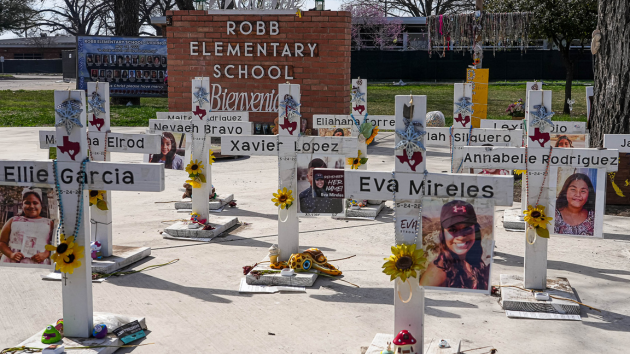Reporter’s notebook: A Black WWII hero is finally honored, 80 years after lifesaving D-Day courage
Written by ABC Audio ALL RIGHTS RESERVED on June 4, 2024

(ARLINGTON, Va.) — To reach Waverly B. Woodson, Jr.’s final resting place, you start on Eisenhower Drive. At the end of Marshall Drive, you make a half turn around Patton Circle, and there, tucked in the southeast corner, you’ll find grave no. 1172, a simple marble headstone like 400,000 others at Arlington National Cemetery.
Not far away, along the same trajectory, lies the Pentagon, where the question of how to honor Woodson — the forgotten hero of D-Day — has bedeviled the Army in recent years. Woodson was nominated for the Medal of Honor in the summer of 1944. He did not receive it: no Black soldiers received our nation’s highest military honor during World War II.
While I was researching my book, “Forgotten: The Untold Story of D-Day’s Black Heroes,” I learned about Woodson’s nomination. I shared the story with Woodson’s unstoppable wife, Joann, who, along with a battery of allies, began calling on the Army to reconsider Woodson’s case.
Kevin Braafladt, a curious Illinois-based historian with the First Army, picked up the trail, investing two years of his own time hunting for more records that would prove that Woodson — who, along with others in his unit, was awarded the fourth-place Bronze Star — deserved far greater recognition. His report would prompt the Army to reopen the case.
On Monday, Sen. Chris Van Hollen (D-MD), who championed Woodson’s case on Capitol Hill, announced that the Pentagon would posthumously award Woodson the Army’s second-highest honor, the Distinguished Service Cross.
Woodson “has never received the full recognition that his actions clearly merited – largely due to the color of his skin. That’s why we’ve fought for years to secure the acknowledgement he deserved,” Van Hollen said in a statement.
The Woodsons were VIP guests of the French government in 1994, for the 50th anniversary of D-Day. Motorcades swept them from plane to hotel to Omaha Beach. A palm-sized medal that Joann still treasures acknowledged her husband’s service.
That occasion marked the first time Waverly Woodson told his story publicly. “There is no hero, it’s just that you’re there and you do what you can do,” he told ABC News at the time.
Now 95, Joann Woodson waited three more decades for her own country to recognize her husband’s heroics. “There’s not enough words to say how thankful I am,” she said from her home in Clarksburg, Maryland, about the Distinguished Service Cross. “This has been a long time coming.”
Joann Woodson will be watching as her husband’s story is featured in the docuseries “Erased: WW2’s Heroes of Color,” narrated by Idris Elba, which began airing Monday on National Geographic TV and streaming soon after on Disney+/Hulu.
Woodson was a premedical student in Pennsylvania when he enlisted in the Army in December 1942. He passed officer training school but race-based quotas scrubbed his promotion, and he retrained as a medic with the 320th Barrage Balloon Battalion, the only Black combat unit that landed with the infantry on Omaha Beach on D-Day.
On the morning of June 6, 1944, Woodson, 21, was seriously wounded on the approach to Omaha Beach when shrapnel tore into his inner thigh and buttocks. “I am dying,” Woodson thought, according to an account he wrote years after the war.
Another medic patched him up and, beneath a barrage of punishing enemy fire, Woodson set up a medical station and worked though his own pain for the next 30 hours, saving untold lives, until he collapsed. After he was treated on a hospital ship, he asked to go back to the beach.
Woodson returned home a star: his exploits made coast-to-coast news in the Black press. But like many other chapters in U.S. history, Woodson, and his battalion, were excluded from the story of D-Day. Most books do not mention them. Popular films about World War II largely do not show Black fighters.
Yet by the end of that very long day, there would be some 2,000 African Americans on the beaches of Normandy. The 320th Barrage Balloon battalion went on to spend 140 days there while the allies pushed toward Berlin, and victory.
The men of the 320th raised a curtain of hydrogen-filled balloons, armed with small bombs, to protect the men and materiel on the beach from dive-bombing German planes. Other Black troops worked to recover vehicles that sank in the rising tide. Commendations from General Eisenhower lauded two Black units, including the 320th, for their exemplary service.
The Oscar-winning Hollywood director John Ford, who came ashore at Omaha Beach with a Coast Guard camera crew, watched from a position of safety as a Black soldier unloaded supplies from a ship, seemingly oblivious to the relentless machine-gun fire and shells exploding around him. “By God, if anybody deserves a medal, that man does,” Ford wrote some twenty years later.
Odds were against “that man” ever receiving a medal. An independent study commissioned during the Clinton administration concluded that “the racial climate and practice” within the Army during World War II denied Black soldiers the opportunities — and honors — they deserved.
Near Woodson’s grave at Arlington, a road is named after another storied general, Omar Bradley, who once said that every man on Omaha Beach was a hero. But clearly, not all heroes were treated equally. While some received medals and our collective thanks, others were forgotten.
“There were no Black soldiers at D-Day,” I was told throughout the five years I worked on my book. I still hear it today.
Joann Woodson is hoping the Distinguished Service Cross will ensure her husband’s legacy is protected. She is hoping it may even be a stepping stone to the big one — the Medal of Honor. She is not alone. Braafladt, the enterprising historian, has more archives to explore on his to-do list, more records yet to uncover.
“So the search will go on,” he said.
Linda Hervieux is a journalist and author of “Forgotten: The Untold Story of D-Day’s Black Heroes.”
Copyright © 2024, ABC Audio. All rights reserved.
 KVSP
KVSP 




